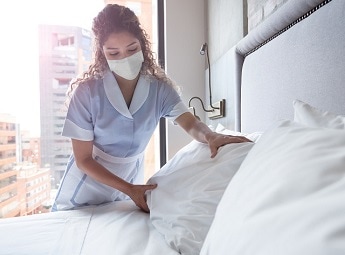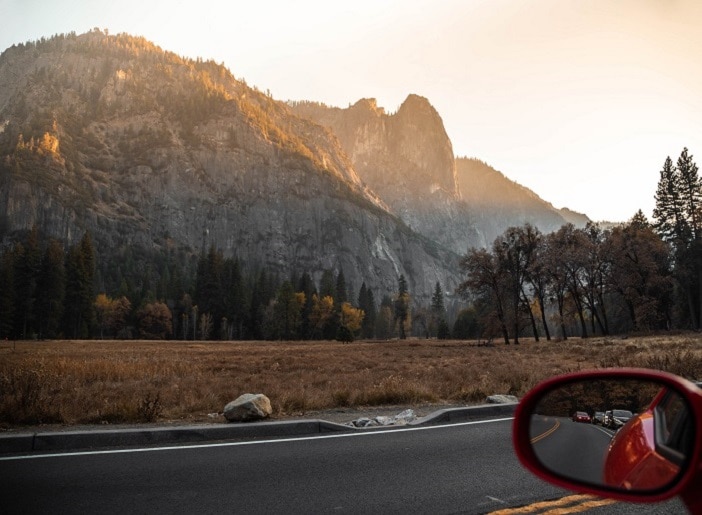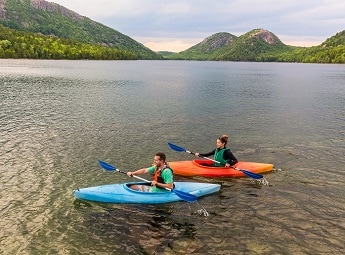August 13, 2020
How to Travel Safely in the Wake of the Coronavirus Pandemic

By Maya Kachroo-Levine
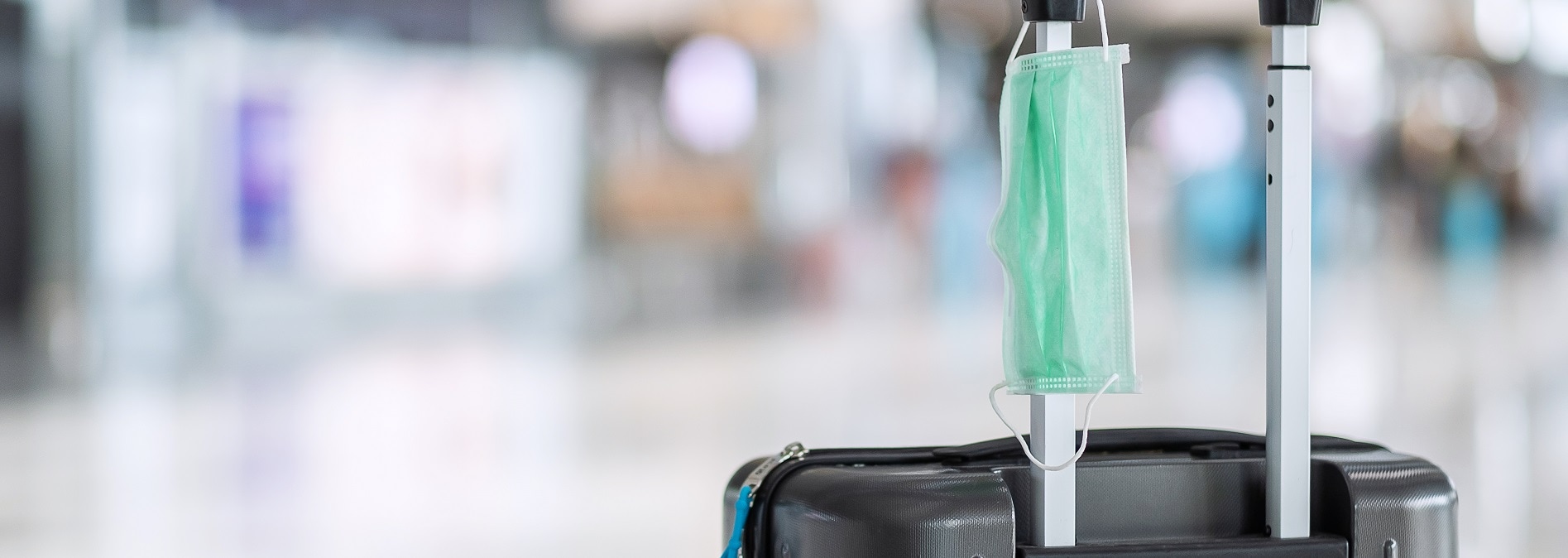
Panuwat Dangsungnoen/Getty Images
This article originally appeared on Departures.com. Departures is published by Meredith Corp. and owned by American Express. While American Express Card Member benefits are highlighted in this publication, including through the links indicated below, the content of this article was independently written by the editorial staff at Meredith. Other Departures content paid for by American Express is explicitly marked as such. It has been reproduced with minor changes with permission from Departures.com.
What precautions to take, what questions to ask, and what safe travel trends are on the rise.
In the era of COVID-19, how travelers approach vacation has changed in every possible way. The era of spontaneous travel seems to be returning as booking windows shorten—VacationRenter reports lead time for booking vacations has decreased by 68%. Where once vacationers booked luxury homes in the Alps seven months in advance, they are now renting a house in Hamptons for next weekend. The increase in instant bookings is likely a reaction to being cooped up at home, while the decrease in advanced bookings comes from general COVID-19 uncertainty. But along with travelers’ new-found impulse to book a vacation for next week comes their increased fervor for health precautions at hotels, in rental homes, on planes and ships, and of course, while exploring new places.
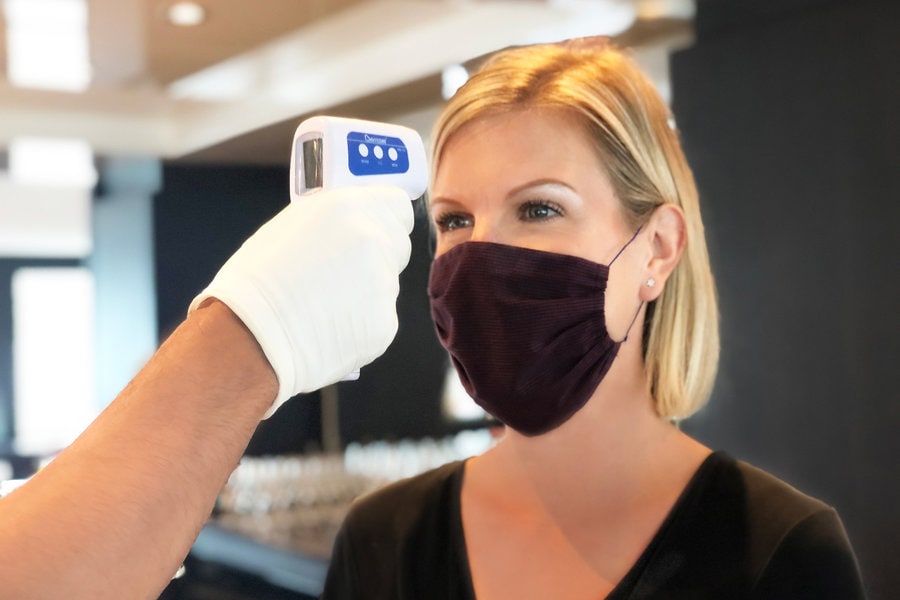
Courtesy AMA Waterways
At luxury hotels, precautions now go far beyond just a provided face mask and hand sanitizer—though face masks and sanitizing stations are still a crucial component of hotels’ COVID response plan. In addition to providing masks and copious amounts of hand sanitizer, Hotel Figueroa, a luxury downtown Los Angeles boutique hotel and an American Express Hotel Collection partner, leaves a full 24 hours between bookings in each hotel room. As one of the first hotels to receive a ‘Clean & Safe’ certification from California Hotel & Lodging Association, Hotel Fig has a socially distanced outdoor pool, operating at 40% capacity with lounge chairs spaced more than six feet apart, and a 10-foot social distancing policy between guests and staff. Each staff member is masked and does a temperature check at the beginning of their shift, and confined spaces, such as the elevators, have a two-person capacity limit.
Guests should make sure their chosen hotel is taking every precaution before booking—in addition to reading the updated guidelines on your hotel’s website or social media pages, call the hotel to see how the policy is enforced. Remember, an updated health policy is not enough in the era of COVID-19—you need to make sure that your hotel is strictly adhering to protocols they’ve put in place.
“Staying six feet away from a coworker or guest at all times is much easier said than done, and it takes practice to form the correct new habits that will protect us while also providing a genuine experience,” says Connie Wang, managing director at Hotel Figueroa. "The greatest lesson we’ve learned was that we needed to re-design every aspect of how we interact with guests and with one another.”
Walking the line between luxury hospitality and strict enforcement of COVID-19 protocols has proven to be a challenge. But James Whitney, PhD and professor of virology at Harvard Medical School says, after renting private homes, hotels have the potential to be the safest way to vacation because they have the space for thorough distancing—especially if they are operating at reduced capacity. Whitney, who also works with the Center for Virology and Vaccine Research, says when faced with the choice of how to vacation, an entirely private space (like a home rental) followed by a hotel are probably the safest choices, because they offer more opportunity for distancing than an aircraft or public transportation vessel might. When booking a hotel, guests should feel empowered to ask exactly how distance rules are enforced.
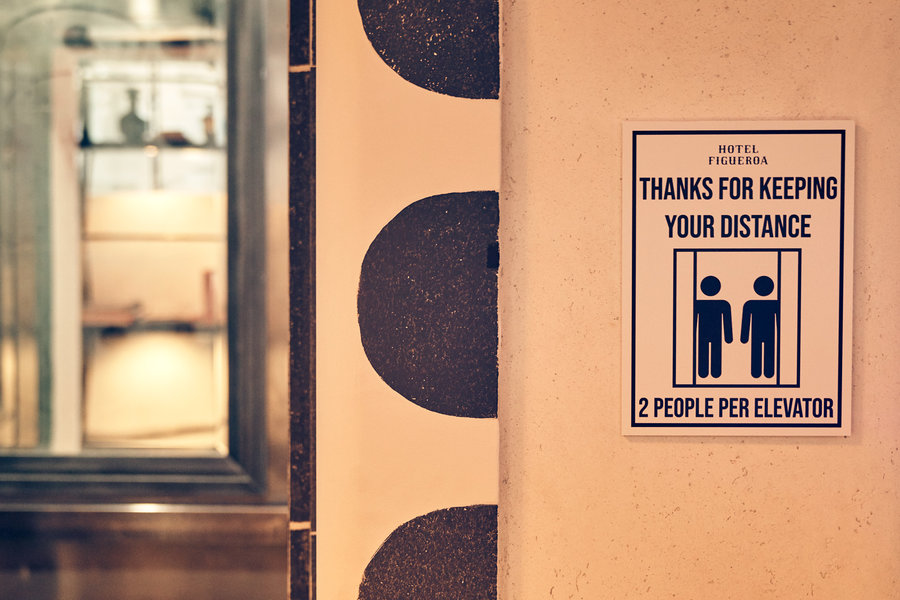
Josh Telles/Courtesy Hotel Figueroa
“We have security and other staff members constantly monitoring our public space to enforce the mask and distancing policy.” says Wang. “For those guests who have misplaced their face coverings, our team is armed with complimentary masks and a thank you.”
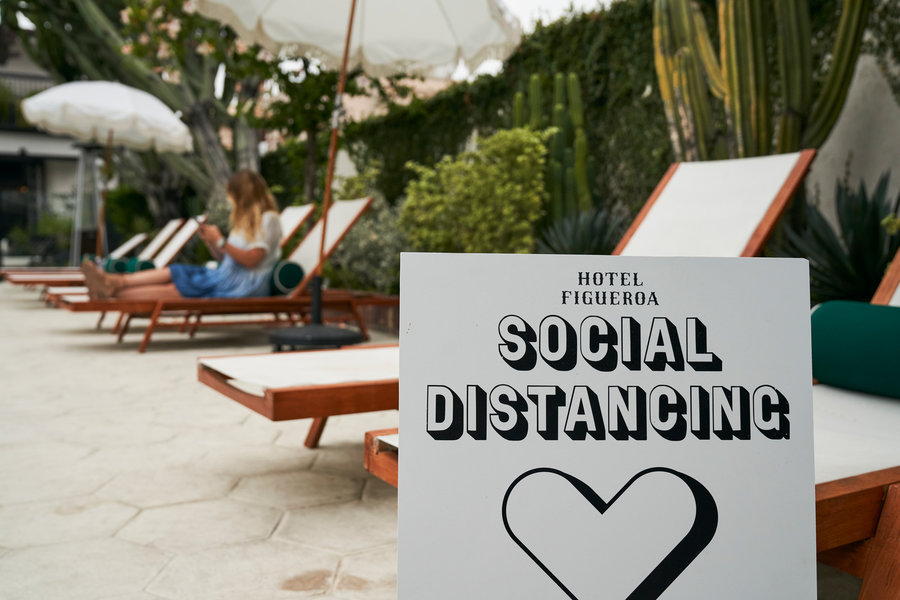
Josh Telles/Courtesy Hotel Figueroa
Guests should also pay close attention to how technology and the digital experience are increasing safety in the wake of COVID-19. For example, self check-in kiosks and 24-hour text message support are now offered at the Hotel Fig, and all ordering at their al fresco restaurant and poolside is done through their website. Pool guests just scan the barcode attached to their pool lounger or table, which brings them to the restaurant’s menu and mobile ordering platform.
Digital communication to replace most guest interactions, mask and distancing requirements, and stringent cleaning procedures are the gold standard for hotel stays in the era of COVID-19. As for getting to your destination—be it a hotel or a private rental home, “certainly travel in a private vehicle is much preferred over communal travel of any type,” says Whitney.
In keeping with Whitney’s advice, vacations via private transportation are going through the roof, with RV rentals up over 300% versus previous all-time highs, according to VacationRenter. The vacation rental site is also seeing an uptick in destinations within less than three-hour drives from cities to reduce stops and exposure along the road trip route.
For car or RV travel, Marco del Rosario, Chief Operating Officer at VacationRenter recommends travelers “map out where the gas stations are along the way to your destination, which restaurants offer contactless curbside pick-up, and the general surrounding area of where you will be staying, so that nothing is a surprise.”
Del Rosario also highly recommends asking questions of hosts when renting out vacation homes—it’s the easiest way to know if they are emulating the 24-hour between check-in practice that many hotels are observing. Before booking, “find out if your host is keeping the property vacant in between check-ins, which helps to reduce the spread of any potential germs that may linger in between groups,” says Del Rosario.
For vacationers looking into public modes of transportation like planes or cruise ships, the distancing hurdles are much greater. Professor Whitney says that even if their cleanliness is optimal, the close quarters pose a serious issue.
Because cruising and flying happens in a more confined space, as compared to a hotel stay, travelers need to be even more aware of heightened safety precautions. Karst says in addition to masks and rigorous sanitizing practices, they have plexiglass in the lounge areas between each conversation circle, and a revamped in-room dining program for those who don’t yet feel comfortable visiting their restaurants.
Air filtration in smaller spaces is another important factor in the wake of COVID-19, and travelers do not want to see recycled air in their private spaces. Onboard AmaWaterways ships, they minimize contact even within the realm of air filtration. “We do not recirculate air—each stateroom has their own individual fan coil air cooling and heating units,” says Karst.
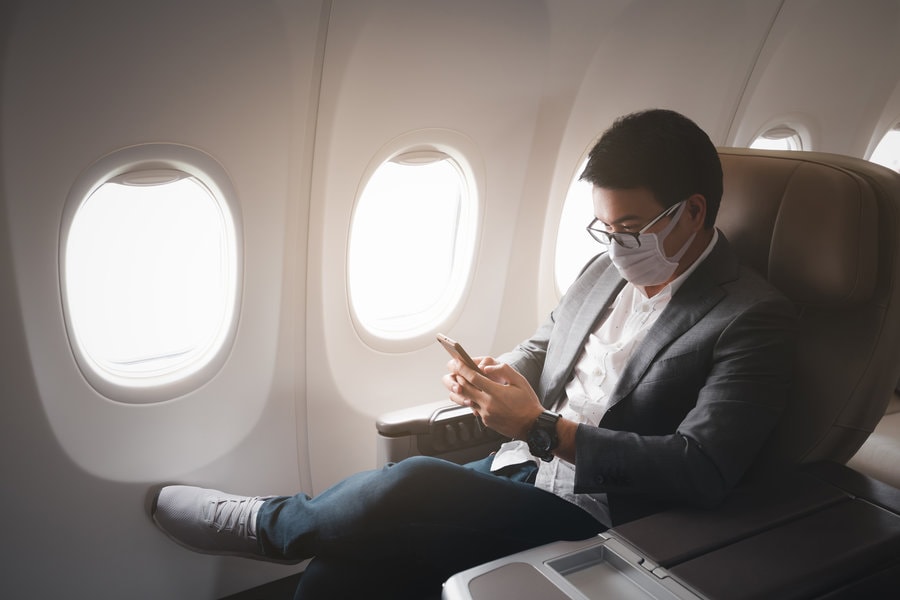
Mongkol Chuewong/Getty Images
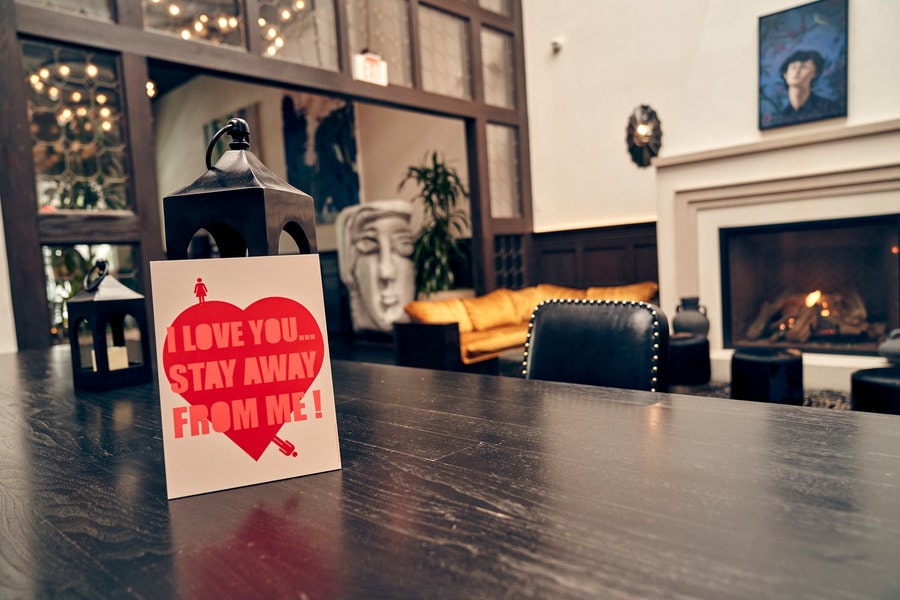
Josh Telles/Courtesy Hotel Figueroa
The final challenge in vacationing—whether at a luxe home rental or hotel—is sight-seeing or interacting with attractions in your area. Boutique cruising has a promising approach to this; all sight-seeing is done in small groups, curated in strict accordance with CDC-guidelines, and thorough screening procedures.The beauty of booking a vacation through just one entity—like a cruise line—is they will handle the health safety of every other aspect of your trip, seeking out the areas devoid of high foot traffic and ensuring private experiences for their guests.
For those putting together an itinerary themselves, Whitney says to avoid “areas with high volumes of people, like crowded beaches, bars, and restaurants where distancing is difficult.”
This doesn’t necessarily mean there’s no space for the beach if you’re heading to Cape Cod—but it does mean additional research and planning ahead is necessary. Instead of going out to dinner at 7 p.m., the solution may be to have an al fresco drink on a restaurant patio in the mid-afternoon.
Ultimately, safety while traveling in the era of COVID-19 starts with sanitizing and face masks, and extends to thoroughly distanced or private experiences whenever possible. Whitney says that masks and hand hygiene should be at the forefront of any vacation plan and itineraries should focus on areas without crowds. When booking private jet or cruise travel, the boutique companies may offer a more intimate experience, though many larger-scale hotels and vessels are now operating at a limited capacity. Finally, be thorough in asking questions while booking your next vacation, and give preference to hotels and vacation rentals with contactless experiences and longer periods of vacancy between hostings.
Hotels
As Hotels Reopen, Heightened Cleanliness Standards Are Top of Mind
Roadtrips
These National Park Road Trips are Fun for the Whole Family
Weekend Getaways




